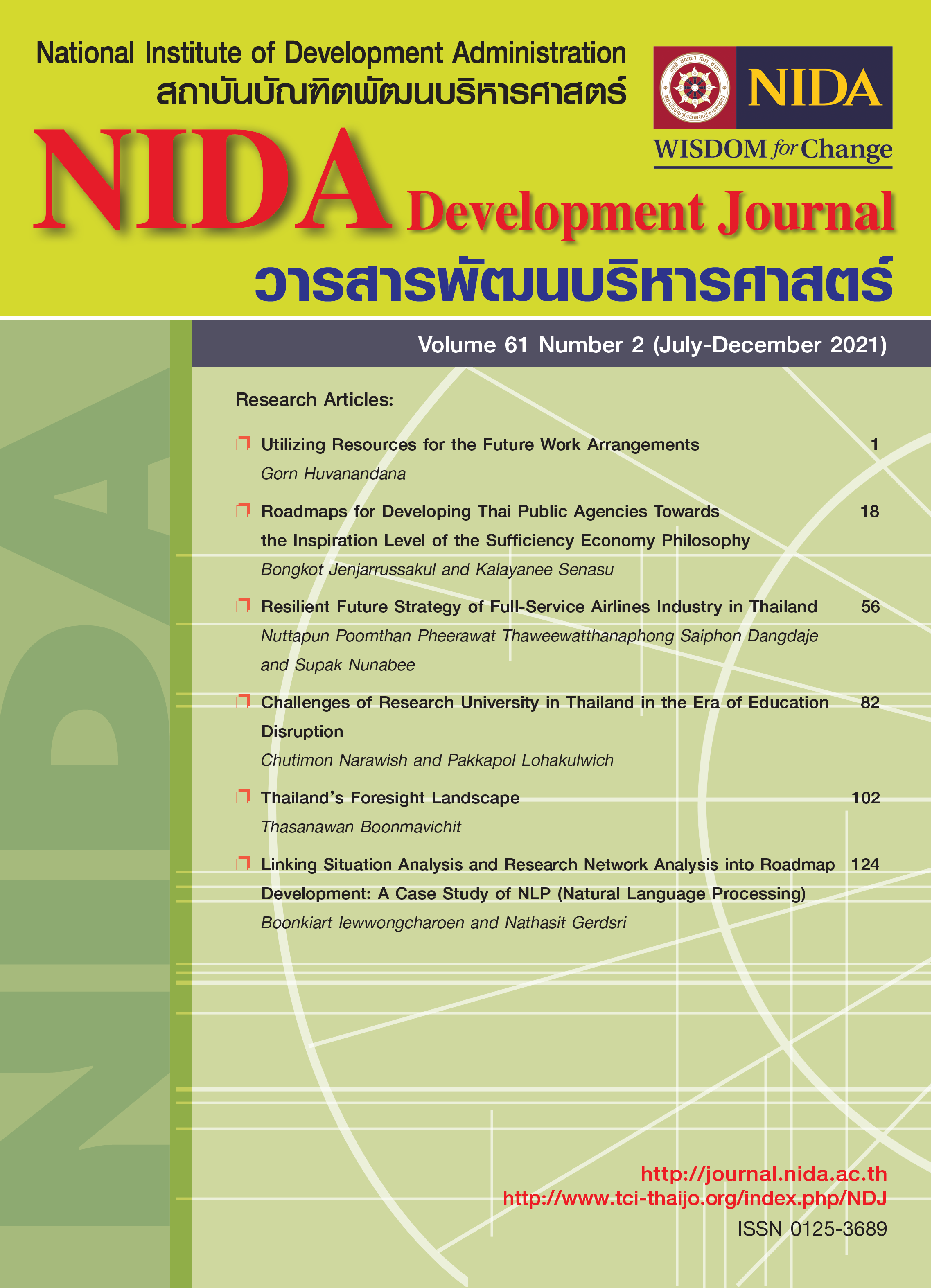Utilizing Resources for the Future Work Arrangements
Keywords:
HRM, WFH, Remote work, Flexible workplace, Human capitalAbstract
In today’s VUCA environment, the world has faced many uncertain challenges, from technological disruptions to demographic changes that lead to new behaviors that result in inevitable business transformations. Adding to that, a global pandemic of COVID-19 has greatly affected all people's adjustments to the "new normal" ways of living. As a result, flexible work arrangements such as WFH or remote work have emerged as one of the key themes in the HRM realm following the changing terrain. Given that these arrangements have managerial implications for the leadership and decision-makers, this article aimed to portray the impact of the changes in global terrain on how people adjusted to the new way of working. Furthermore, given that COVID-19 outbreaks are likely to persist and become a local epidemic, this article attempted to forecast the future of work arrangements, including innovative ways for people to adjust to new ways of working.Key themes emphasized new skills and competencies required in response to the digital landscape, flexible work arrangements from the physical workplace to how actual tasks and work can be restructured to suit organizational needs, as well as fostering a sense of community that promotes human interactions to support learning and knowledge transfer. The article adds to the understanding of HRM through foresights that promote strategic policy making and contribute to the organization’s sustainable growth in the long run.
References
Adedoyin, O. B., & Soykan, E. (2020). Covid-19 pandemic and online learning: the challenges and opportunities. Interactive Learning Environments, 1-13.
Baker, E., Avery, G. C., & Crawford, J. D. (2007). Satisfaction and perceived productivity when professionals work from home. Research & Practice in Human Resource Management, 15(1), 37-62.
Baldonado, A. M. (2018). Leadership and Gen Z: Motivating Gen Z Workers and Their Impact to the Future. International Journal of Managerial Studies and Research, 6(1), 56-60.
Bouncken, R. B., & Reuschel, A. J. (2018). Coworking-spaces: how a phenomenon of the sharing economy builds a novel trend for the workplace and for entrepreneurship. Review of Managerial Science, 12(1), 317-334.
Cegarra-Navarro, J. G., & Wensley, A. (2019). Promoting intentional unlearning through an unlearning cycle. Journal of Organizational Change Management, 32(1), 67-79.
Cheese, P. (2020). A flexible working future–the opportunities and challenges. In Flexible Work (pp. 9-32). Routledge.
Chen, Y., & Fulmer, I. S. (2018). Fine‐tuning what we know about employees' experience with flexible work arrangements and their job attitudes. Human Resource Management, 57(1), 381-395.
Feola, G. (2020). Capitalism in sustainability transitions research: Time for a critical turn?. Environmental Innovation and Societal Transitions, 35, 241-250.
Galanti, T., Guidetti, G., Mazzei, E., Zappalà, S., & Toscano, F. (2021). Work from home during the COVID-19 outbreak: The impact on employees’ remote work productivity, engagement, and stress. Journal of Occupational and Environmental Medicine, 63(7), e426-e432.
Gallacher, G., & Hossain, I. (2020). Remote work and employment dynamics under COVID-19: Evidence from Canada. Canadian Public Policy, 46(S1), S44-S54.
Giovanis, E. (2018). The relationship between teleworking, traffic, and air pollution. Atmospheric Pollution Research, 9(1), 1-14.
Groen, B. A., Van Triest, S. P., Coers, M., & WtenweerdeWtenweerde, N. (2018). Managing flexible work arrangements: Teleworking and output controls. European Management Journal, 36(6), 727-735.
Hayman, J. R. (2009). Flexible work arrangements: Exploring the linkages between perceived usability of flexible work schedules and work/life balance. Community, Work & Family, 12(3), 327-338.
Hunter, P. (2019). Remote working in research: An increasing usage of flexible work arrangements can improve productivity and creativity. EMBO Reports, 20(1), e47435.
Jalagat, R., & Jalagat, A. (2019). Rationalizing remote working concept and its implications on employee productivity. Global Journal of Advanced Research, 6(3), 95-100.
Leite, I., Pereira, A., Mascarenhas, S., Martinho, C., Prada, R., & Paiva, A. (2013). The influence of empathy in human–robot relations. International Journal of Human-computer Studies, 71(3), 250-260.
Lim, A., & Okuno, H. G. (2015). A recipe for empathy. International Journal of Social Robotics, 7(1), 35-49.
Maloni, M., Hiatt, M. S., & Campbell, S. (2019). Understanding the work values of Gen Z business students. The International Journal of Management Education, 17(3), 1-13.
Miceli, A., Hagen, B., Riccardi, M. P., Sotti, F., & Settembre-Blundo, D. (2021). Thriving, not just surviving in changing times: How sustainability, agility and digitalization intertwine with organizational resilience. Sustainability, 13(4), 2052.
Model, A. M. M. (2021). Overall Job Performance, Remote Work Engagement, Living With Children, and Remote Work Productivity During the COVID-19 Pandemic. European Journal of Psychology Open, 80(3), 133-142.
Montemayor, C., Halpern, J., & Fairweather, A. (2021). In principle obstacles for empathic AI: why we can’t replace human empathy in healthcare. AI & Society, 1-7.
Nash, C. (2020). Report on digital literacy in academic meetings during the 2020 COVID-19 lockdown. Challenges, 11(2), 20.
Olga, H. (2020). In search of a digital nomad: defining the phenomenon. Information Technology & Tourism, 22(3), 335-353.
Pierleoni, M. R. (2020). Capitalism after the Coronavirus: Public Goods, Sustainability and the Role of the State. Theoretical Economics Letters, 10(4), 868-874.
Sutherland, W., & Jarrahi, M. H. (2017). The gig economy and information infrastructure: The case of the digital nomad community. Proceedings of the ACM on human-computer interaction, 1(CSCW), 1-24.
Vallas, S., & Schor, J. B. (2020). What do platforms do? Understanding the gig economy. Annual Review of Sociology, 46, 273-294.
Wang, B., Liu, Y., Qian, J., & Parker, S. K. (2021). Achieving effective remote working during the COVID‐19 pandemic: A work design perspective. Applied Psychology, 70(1), 16-59.
Downloads
Published
How to Cite
Issue
Section
License
Copyright (c) 2023 NIDA Development Journal

This work is licensed under a Creative Commons Attribution-NonCommercial-NoDerivatives 4.0 International License.





